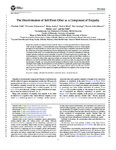The discrimination of self from other as a component of empathy.
| dc.contributor.author | Little, C | |
| dc.contributor.author | Solomonova, E | |
| dc.contributor.author | Jordan, M | |
| dc.contributor.author | Klein, N | |
| dc.contributor.author | Jennings, B | |
| dc.contributor.author | Schmidtmann, Gunnar | |
| dc.contributor.author | Leos, H | |
| dc.contributor.author | Gold, I | |
| dc.date.accessioned | 2023-01-04T13:50:46Z | |
| dc.date.available | 2023-01-04T13:50:46Z | |
| dc.date.issued | 2022-12-22 | |
| dc.identifier.issn | 1528-3542 | |
| dc.identifier.issn | 1931-1516 | |
| dc.identifier.uri | http://hdl.handle.net/10026.1/20137 | |
| dc.description.abstract |
Despite the centrality of empathy in human social life, there is no widely agreed definition or characterization of the concept of empathy. A common thread in many of the proposed definitions, however, is that empathy presupposes the discrimination of self and other on the grounds that, to empathize with another individual, the mental state of the target individual must first be distinguished from the empathizer's own mental state. The purpose of this study is to investigate this proposal empirically. We employed a paradigm in which participants rated the emotional valence and degree of arousal of 93 facial expressions of mental states. We asked participants to infer the mental state represented by each facial expression (the Other condition) as well as to describe the effect of the expression on their own mental state (the Self condition). An absolute difference score between the Other and the Self conditions was used as an index of a capacity for self-other discrimination. Empathy was measured using the Interpersonal Reactivity Index. Results show that individuals high in trait empathy discriminate between self and other to a significantly greater degree when judging mental states than individuals low in trait empathy. This suggests that the capacity for self-other discrimination may be a component of the capacity for empathy and that future investigations of the concept of empathy ought to retain it. | |
| dc.format.extent | 1773-1780 | |
| dc.format.medium | Print-Electronic | |
| dc.language | en | |
| dc.language.iso | eng | |
| dc.publisher | American Psychological Association (APA) | |
| dc.subject | empathy | |
| dc.subject | self-other discrimination | |
| dc.subject | emotional valence | |
| dc.subject | emotional arousal | |
| dc.title | The discrimination of self from other as a component of empathy. | |
| dc.type | journal-article | |
| dc.type | Journal Article | |
| plymouth.author-url | https://www.webofscience.com/api/gateway?GWVersion=2&SrcApp=PARTNER_APP&SrcAuth=LinksAMR&KeyUT=WOS:001059147300017&DestLinkType=FullRecord&DestApp=ALL_WOS&UsrCustomerID=11bb513d99f797142bcfeffcc58ea008 | |
| plymouth.issue | 6 | |
| plymouth.volume | 23 | |
| plymouth.publication-status | Published online | |
| plymouth.journal | Emotion | |
| dc.identifier.doi | 10.1037/emo0001193 | |
| plymouth.organisational-group | /Plymouth | |
| plymouth.organisational-group | /Plymouth/Faculty of Health | |
| plymouth.organisational-group | /Plymouth/Faculty of Health/School of Health Professions | |
| plymouth.organisational-group | /Plymouth/REF 2021 Researchers by UoA | |
| plymouth.organisational-group | /Plymouth/REF 2021 Researchers by UoA/UoA03 Allied Health Professions, Dentistry, Nursing and Pharmacy | |
| plymouth.organisational-group | /Plymouth/Research Groups | |
| plymouth.organisational-group | /Plymouth/Research Groups/Institute of Health and Community | |
| plymouth.organisational-group | /Plymouth/Users by role | |
| plymouth.organisational-group | /Plymouth/Users by role/Academics | |
| dc.publisher.place | United States | |
| dcterms.dateAccepted | 2022-12-22 | |
| dc.rights.embargodate | 2023-1-13 | |
| dc.identifier.eissn | 1931-1516 | |
| dc.rights.embargoperiod | Not known | |
| rioxxterms.versionofrecord | 10.1037/emo0001193 | |
| rioxxterms.licenseref.uri | http://www.rioxx.net/licenses/all-rights-reserved | |
| rioxxterms.type | Journal Article/Review |


